Field Notes: The Rawda Experience - A Mother's Day Special
Honoring my mother in the garden between this world and the next.
“Heaven is at the feet of your mother.”
– The Prophet Muhammad (Peace and Blessings Upon Him, Pbuh).
I wrote the beautiful saying above from the Prophet Muhammad (pbuh) on the dedication page of my PhD dissertation. I also wrote it in my notebook while sitting in the Prophet’s Mosque (pbuh) in Madinah, Saudi Arabia, for the first time... next to my mother... as she read the Quran.
Over a month and a half has passed, and I still cannot believe I was there. The more I sit behind my computer, in what still feels like my post-Pandemic “quarantine life,” I keep wondering... how did I get there? Did it actually happen?
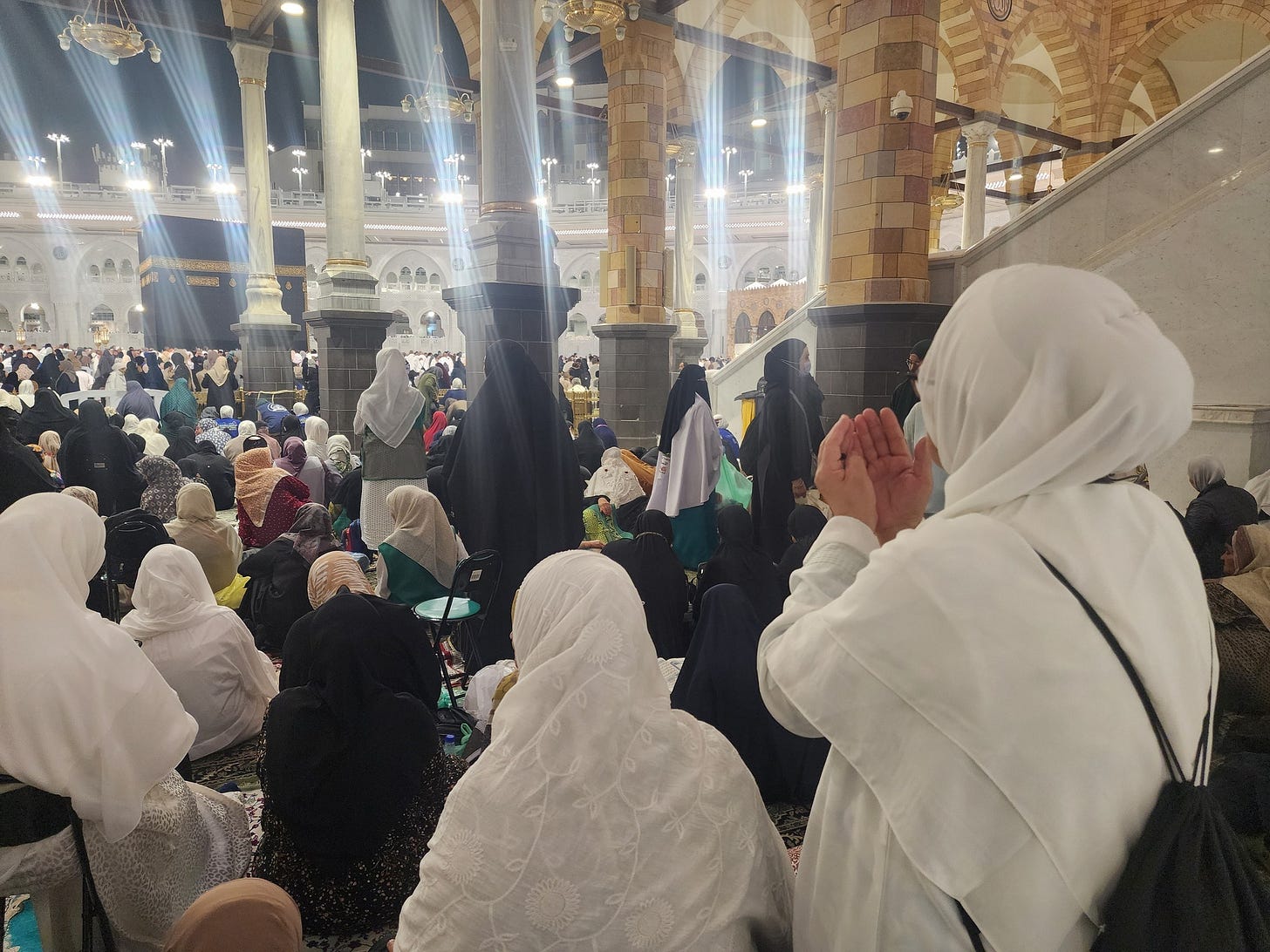
I'm happy I captured these pictures of my mother praying toward the Holy Kaa’bah. Those pictures have become artifacts... a living memory... regenerating something in my brain, rerouting my inner GPS. They remind me of what I felt, and what I want to feel again and again in these spaces.
And one of the most precious moments of all was helping my mother in her Rawda experience.
What is the Rawda?
The Rawda (Al-Rawdah Al-Sharifah), also known as Riaz-ul-Jannah, is a special place inside Al-Masjid an-Nabawi in Madinah. It is located between our Prophet’s (pbuh) tomb and his pulpit, underneath the Green Dome, in the area of the Old Mosque. According to authentic traditions, the Prophet (pbuh) is said to be alive in his grave in the sense that his soul remains connected, and he can respond to the salutations of those who visit him.
His closest companions, Abu Bakr as-Siddiq (may Allah be pleased with him) and Umar ibn al-Khattab (may Allah be pleased with him), are also buried beside him. Our Prophet (pbuh) described this place as “a garden from the Gardens of Paradise” (Bukhari).
"What is between my house and my pulpit is a garden from the gardens of Paradise." (Source: Sahih al-Bukhari, Hadith 1196)
For Muslims, it is considered one of the most blessed places in the world. Simply being able to set foot in this place is a lifelong dream for many.
Duas (prayers) made here are highly recommended, with a greater possibility of acceptance. Because of its significance, pilgrims desperately aspire to enter and pray there. During Ramadan, and other very busy seasons, access is especially limited or constrained because of popular demand.
There's now a new system to enter, requiring a permit through the Nusuk app, a comprehensive platform designed to support Muslim pilgrims. You are allowed only about 20 minutes inside to pray, give salam, and show respect quickly and then exit. Men and women enter from different gates, which is generally the case at the Prophet’s mosque.
My father was able to get an earlier time. My brother couldn’t get a time. You are only allowed one Rawda permit per year. And my mom didn’t get off the waiting list. But I did.
My brother and I agreed…truly if there was any Eid gift we could give Ammi (our mother), it would be the Rawda.
Another sister, in a random conversation at the mosque, suggested that I could push my mom in a wheelchair, so we could both enter together. Her mother was already in a wheelchair. But my mom didn’t want that. Understandably. I wasn’t prepared to see her in a wheelchair either. It just didn’t feel right to either of us. Overall, it is important to follow the rules.
It was Wednesday morning, March 26th, right after Fajr prayer (morning prayer), the time I was assigned. After Fajr, we walked around the building as the sun rose and the umbrella shades began to open around the Mosque as they always do at this time.
We made our way to the back entrance of the women’s section, near the Green Dome. There were about three or four checkpoints for entry into the Rawda. We were pushing through large crowds of women. I was able to accompany my mother through all the checkpoints, right up to the final one where they checked the permit on the app.
The first time we reached the final checkpoint, even with 15-20 minutes remaining before our attendance time, the guard told us to go to the back of the line. So we got out, informed my brother, who suggested we try again. We waited for 10 more minutes. Then we got back in line.
When we reached the final checkpoint again, the female guard demanded we form a single-file line. But because of a railing and people behind us, it wasn’t possible. Another guard approached us aggressively pushed aside the railing and started shouting and shoving us into a single file.
While I tried to protect my mother the whole time, ensuring no pilgrim would shove her — just a daughterly instinct — it was a Saudi female guard who shoved my mom forcefully with both arms.
She didn’t shove anyone else... just an elder, someone who clearly looked older than the young female guard. My mother. That made me upset. It could have bruised her if it were any harder.
When it was our turn to be checked, the guard looked at my phone, and with that, mentioned that only one person was allowed. Her eyes were all I could see, due to her niqab covering her face, and I saw compassion in them, so my fury gently subsided.
I said, “That’s perfectly fine. This is for my mom.” And my mom was let through.
As my mother walked ahead, I waved goodbye with a silent prayer that she’d be okay. I approached the same guard and said, “Hadhihi Ummi... this is my mother.” Pointing at my mom.
I felt like I had adopted that phrase throughout the trip, embracing the “bodyguard” role as an overprotective daughter, at times, not because she needed one, but because the crowds were crazy. Naturally, you can’t stand to see anyone mistreat your mother.
So I added in English, “That was my mom. Allah saw you push my Mom. Please don’t ever do that again... to my mother, or to any elder person. She’s ** years old.”
She nodded her head in agreement. I could tell she felt remorseful. Then I walked away, looked up at the Green Dome, and felt tears well-up in my eyes.
Aftermath and Grace
I didn’t know if I had done the right thing. My body was shaking. I was worried about my mother, heartbroken that someone had shoved her. I can’t bear to see my mother hurt.
Later, my brother reassured me that I did the right thing. He reminded me not to let the moment fester and turn into resentment—that’s when injustice can emerge from the pain.
It was a character-building moment for me, one of many in Madinah. One of many when I conduct fieldwork and explore new places and cultures during travels overseas. And he was right. These guards and workers at the Prophet’s Mosque have tough jobs. Sometimes they make mistakes.
As I looked up again at the Green Dome, I remembered what my brother taught me... to say, “Assalaamu Alayka Ya Rasoolallah” when passing the Prophet’s grave. So I did.
I bid the Prophet (pbuh) my salaam and farewell, “Inshallah, next time, I will be with you.” Then I shed a tear for him.
As I walked away, I saw other sisters in tears after being denied entry because they didn’t have a permit. I comforted one sister in particular—she was in such distress—and I cried with her as well.
So many people spend their life savings to come here, hoping to enter the “Garden from the Gardens of Paradise.” And some never do.
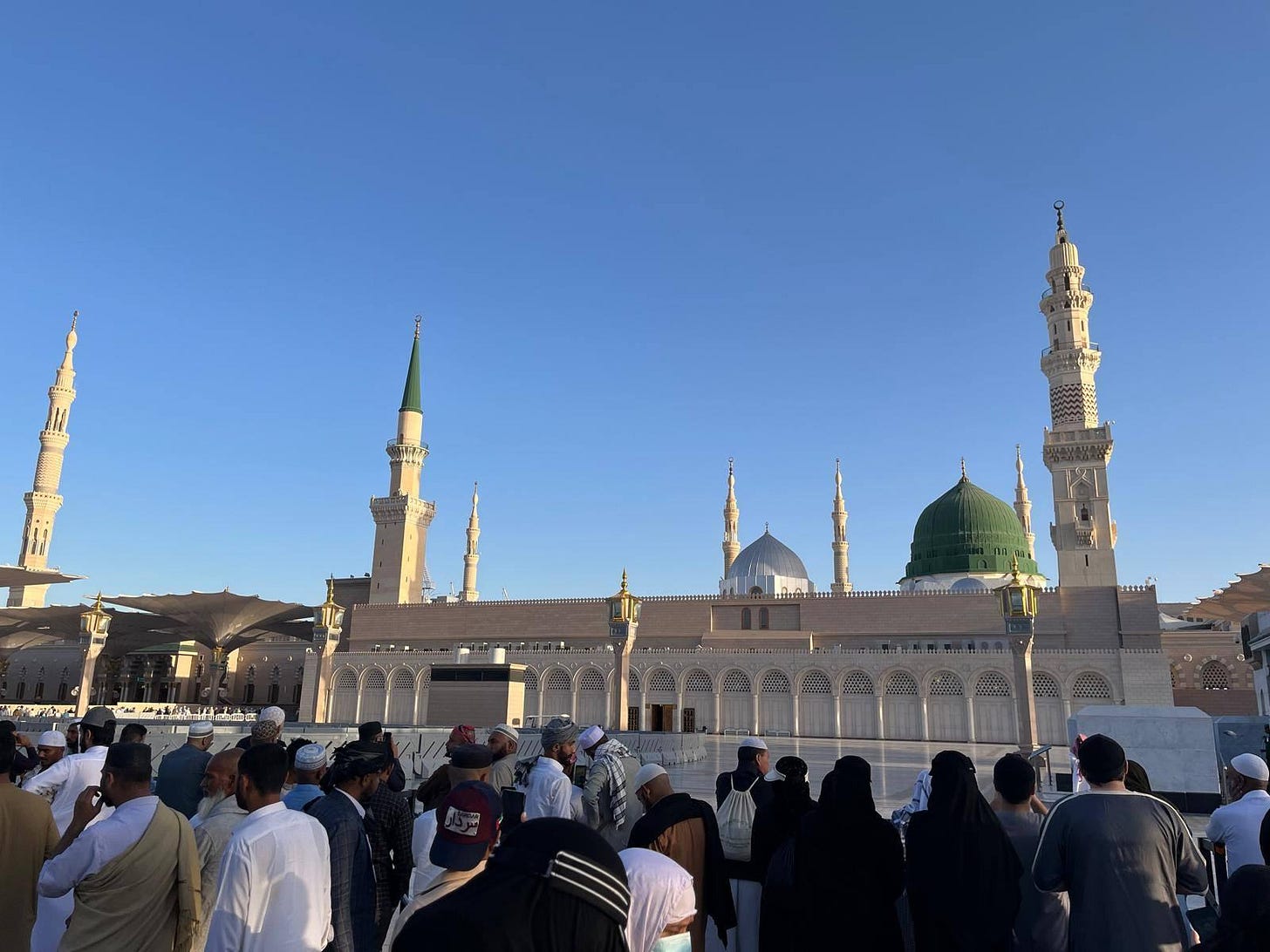
Gratitude and Reflection
I didn’t cry because I couldn’t be there this time. I cried because my mother could be. This trip had always been hers. And maybe Allah brought me along just to give her this small gift in return for all she’s given me.
Maybe she wouldn’t have had the Rawda experience this trip without my phone, which would require my presence there with her. That thought alone gives so much more significance to my being there, especially if my presence had ever felt like a burden to anyone.
The Rawda is a very high-pressure experience... just like the whole pilgrimage. My father told me that when he went with my Dada Abu (my grandfather), in the 70s, people would rush in without lines, permits, or structure. This new system, as described by my younger brother (who works in this space), helps prevent chaos.
Many people, especially from what I witnessed in my own experience, Indian and Pakistani Muslims, spend their savings just to be near the Prophet (pbuh).
One thought keeps returning to me when I reflect on my time in Madinah. I even saw it in my field notes the other day.
This experience, the entire Pilgrimage experience, is a significant test of sabr... of patience.
For women, especially, visiting the Prophet’s mosque is a major test. Our space and access are very limited.
There’s an Urdu phrase my mother used to say to us growing up. I found myself repeating it sometimes in the mosque, especially when we were searching for places to sit in the sisters’ section (a whole story of its own I’ll write about soon in this Qi Fieldnotes series on KSA):
“Dil meh jagah honi chaiye.” There is always room in the heart.
That’s how grand my mother’s heart is. And she absolutely deserved this experience. As my brother Sabih said, if there is someone who would truly appreciate the Rawda more than anyone, it is our mother. The tears that streamed down her face as she exited from the "Garden of the Gardens of Paradise" from Gate 1, said it all.
Later, Ammi told me that the female guard that shoved her came up to her and apologized and asked her if she was okay. Ammi was totally fine. It appears I was more hurt. But knowing that warmed my heart. And made me feel better about that moment.
Our mother taught us Islam and how to read the Holy Quran. This incredible, exhilarating experience was an unforgettable moment with my mom.
To be in the two holiest spaces in the world for Muslims... with my mother... was the greatest blessing I could ask for.
The whole journey started with her intention to perform Umrah during Ramadan— a desire her own mother, my Nani, encouraged her to fulfill.
And I was so grateful I could be there for for my mother, with the blessing of the Rawda in return. It truly brought to life what my mother always says on Mother’s Day: “Every day is Mother’s Day.” And this year, the Rawda was Mother’s Day.
My mother wants me to be successful and happy, and I pray I can give that to her in this life. And I hope one day I will be able to write about my own experience with the Rawda someday, remembering this moment.
I pray we all can give back to our mothers, in whatever ways possible, for everything they have given us, and everything they have sacrificed for us, whether they are still with us, or watching over us from afar.
Thank you for joining The Qualitative Inquisition (Qi) Field Note Series, and reading my brief reflection and story about the Rawda experience in Madinah. I originally intended to share this on Mother’s Day, in honor of the special moment I experienced with my mother during our Pilgrimage.
Please consider subscribing to follow along as I continue sharing observations and fieldnotes from the Kingdom of Saudi Arabia over the next few weeks.
Up next: a reflection on my experience with Zam Zam, the holy water — stay tuned!
I hope everyone had a heartfelt Mother’s Day last week.
Happy Belated Mother's Day to all the mothers, including my two beautiful sisters, who, alongside our mother, always inspire me with their beauty, modesty, grace, intellect, and Islam.
I look forward to continuing the Qi Field Notes Series in the KSA. Thank you for joining me!
In Solidarity,
Dr. Elsa
The Qualitative Inquisition (Qi)

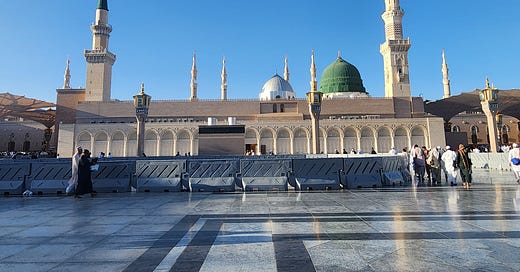



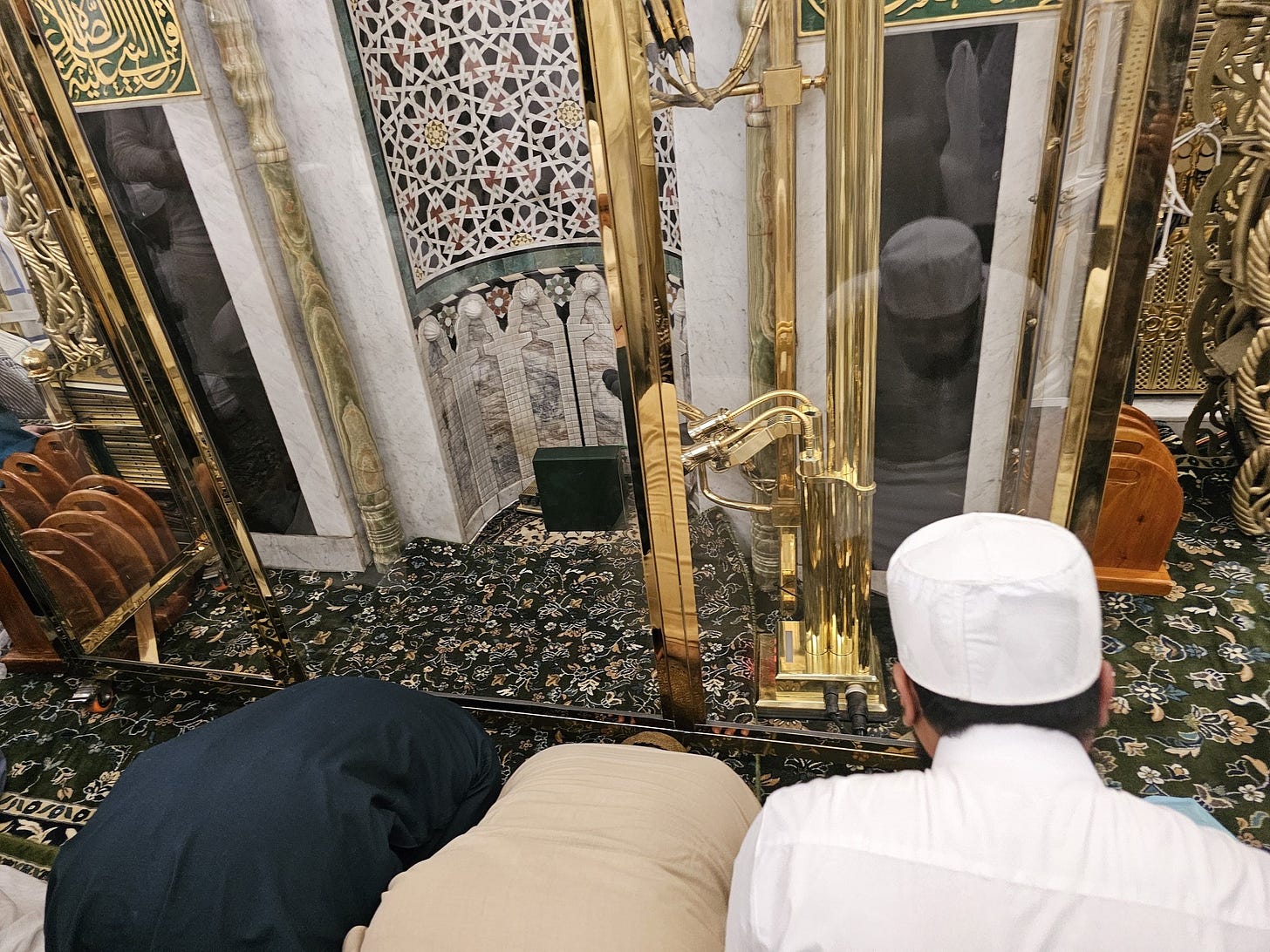
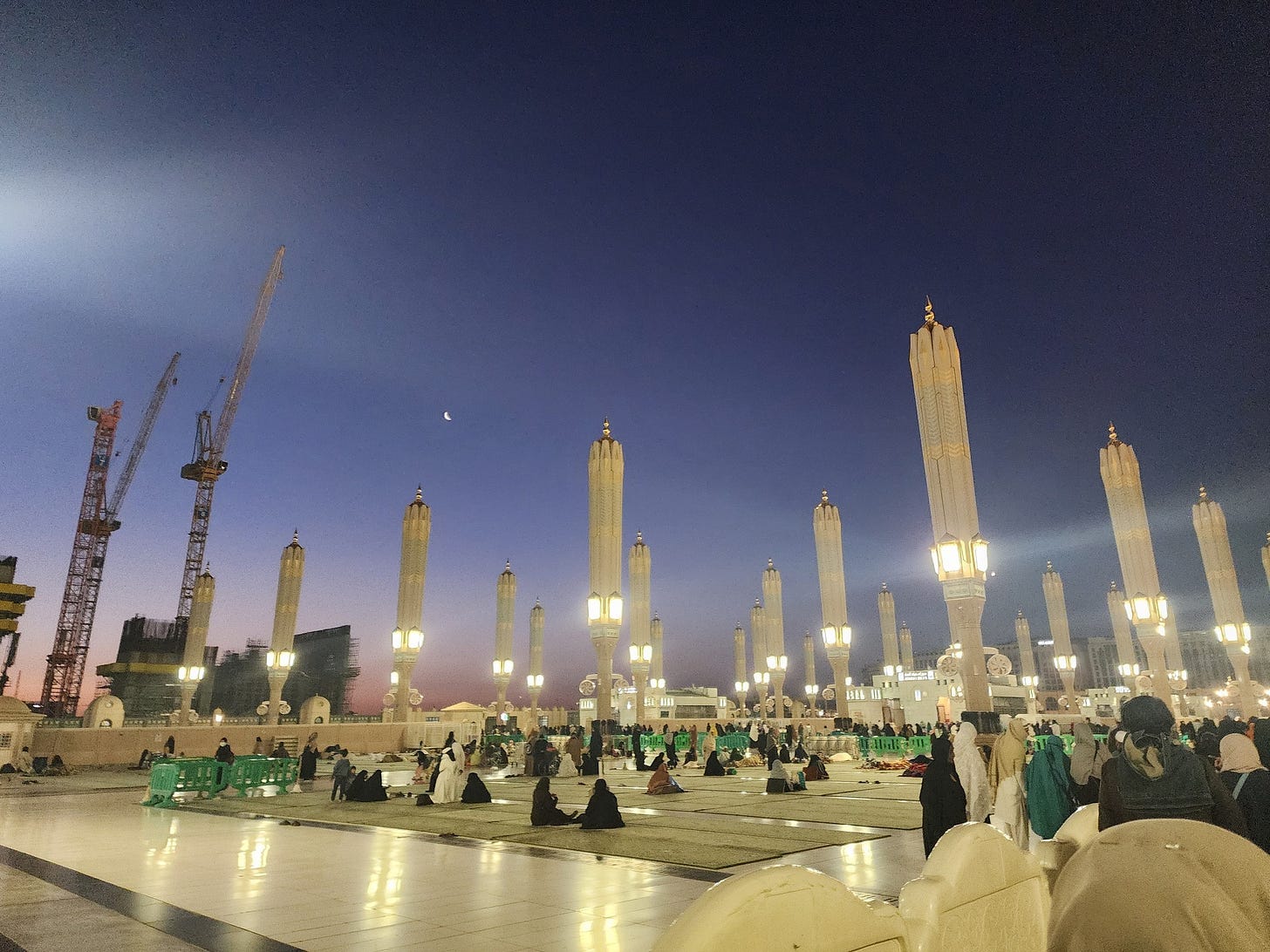
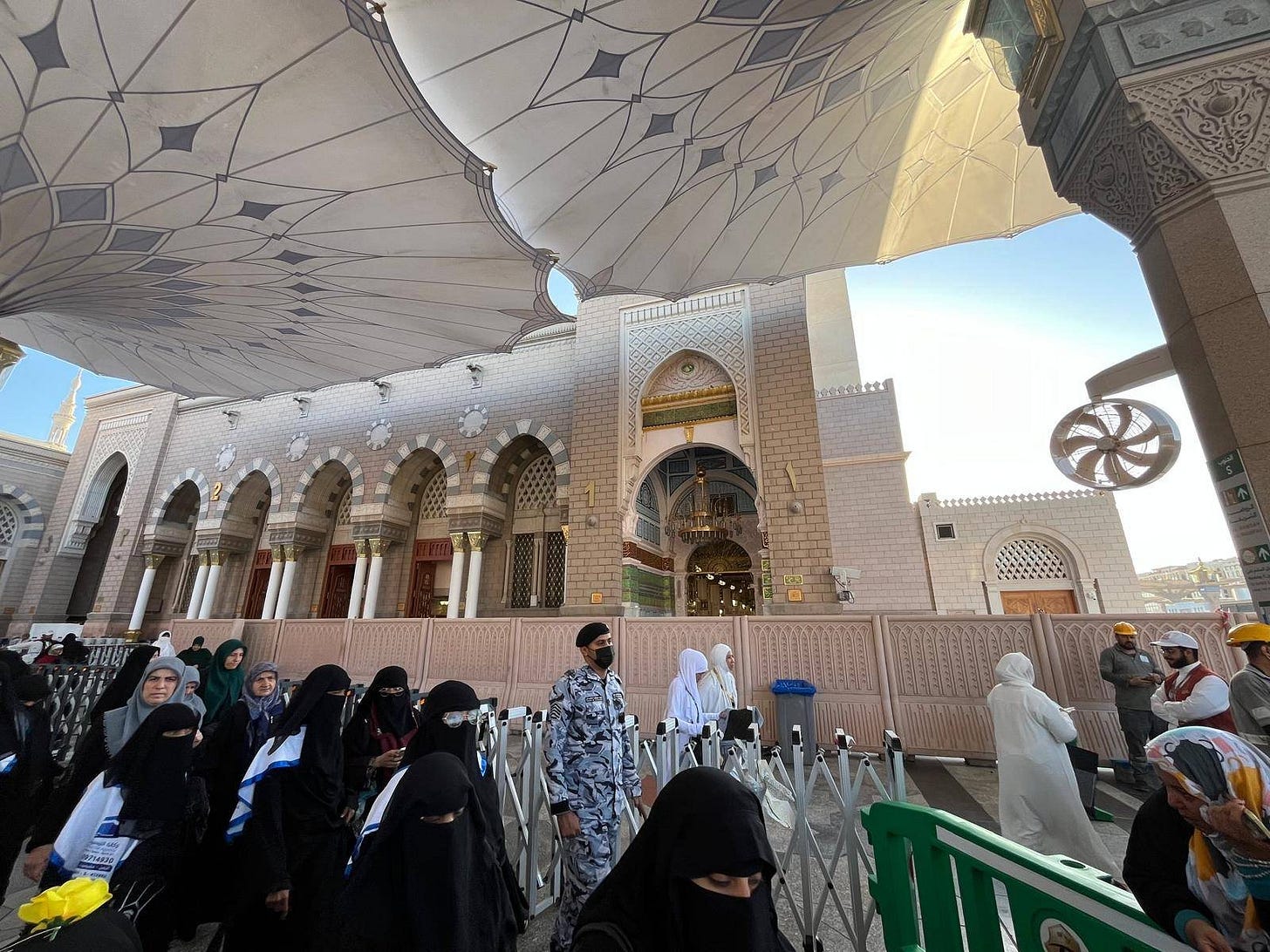
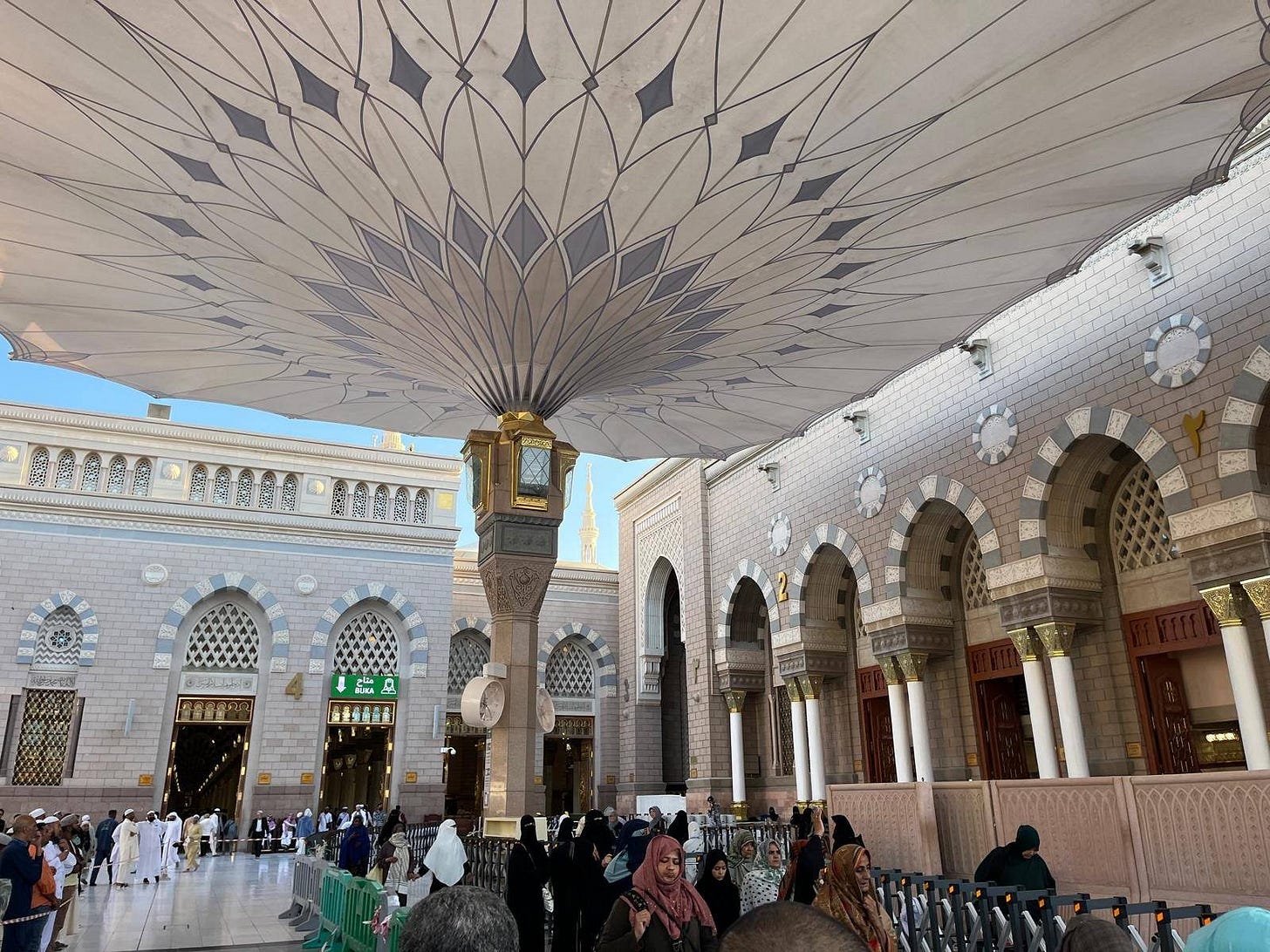
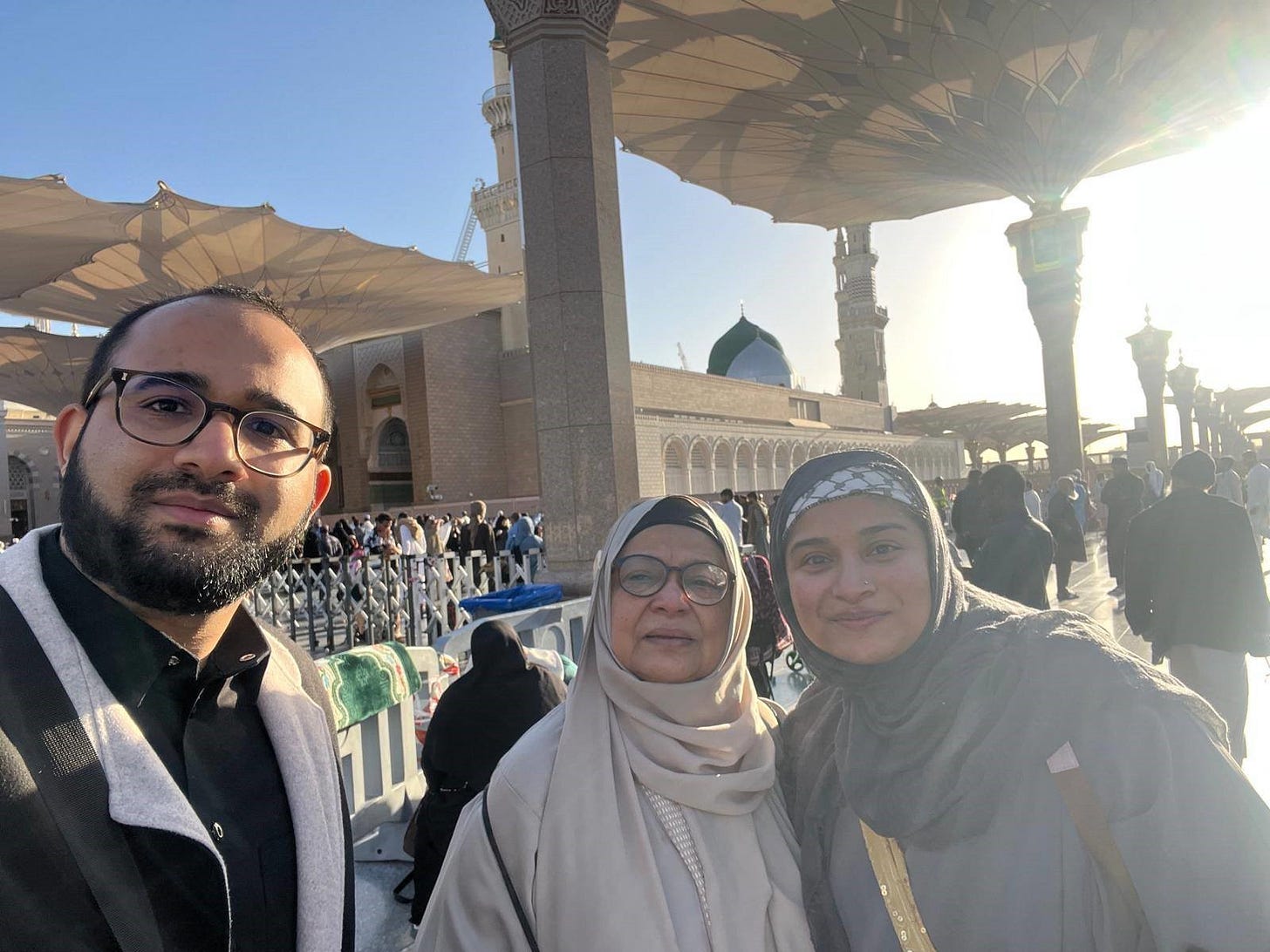
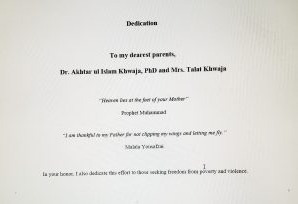
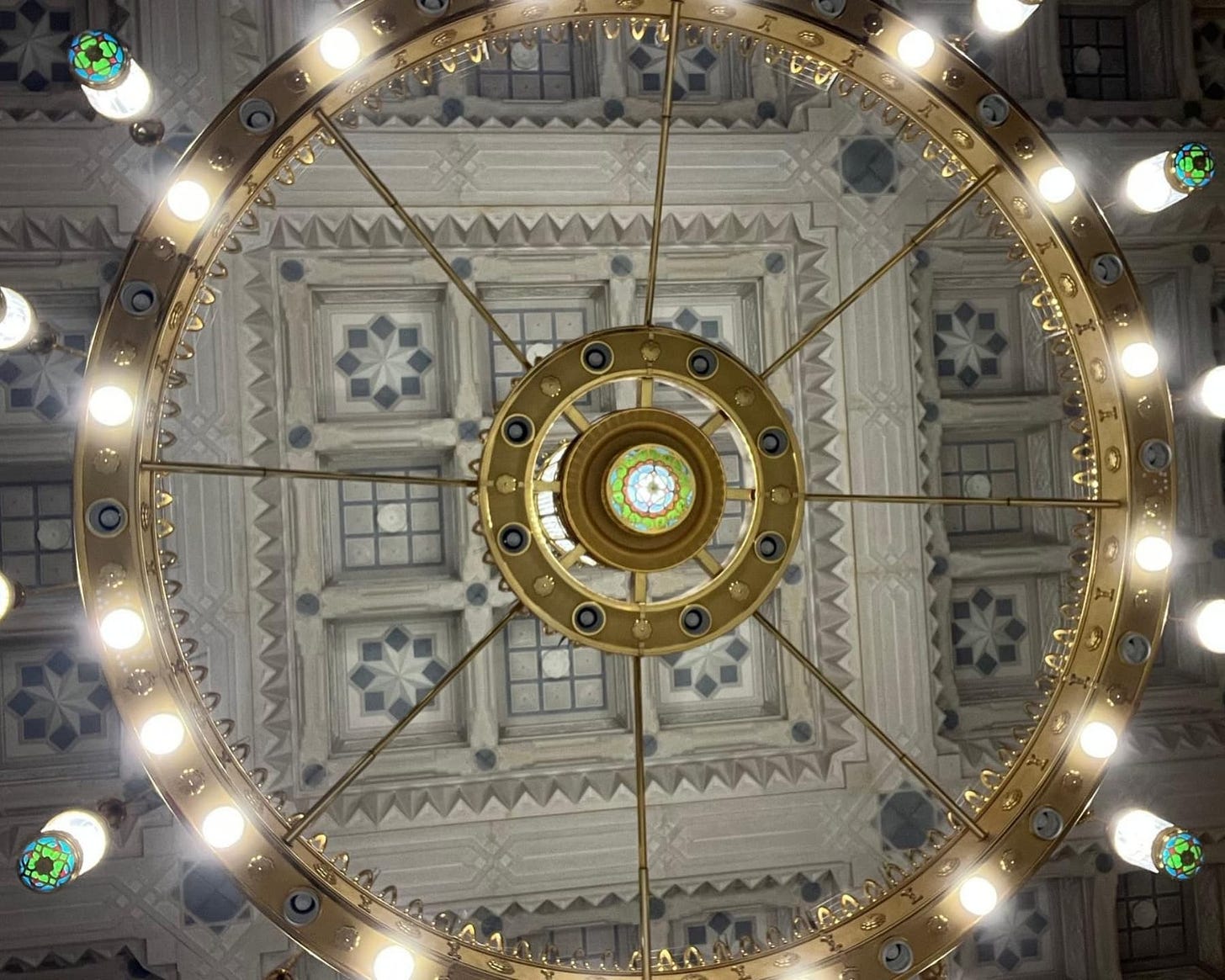
Beautiful. This experience will stay with you (and all of us collectively who read this) for the rest of our lives. Thank you for assisting Ammi throughout the trip. My Allah reward you. Looking forward to the next entry.